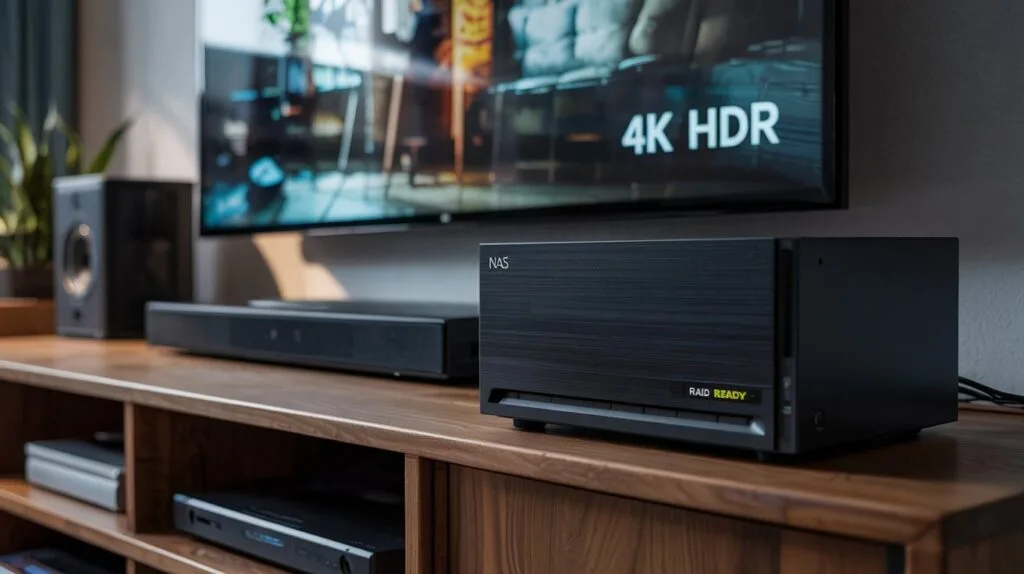Understanding NAS Devices: The Basics
Network Attached Storage (NAS) devices are specialized storage solutions that connect to a network, allowing multiple users and devices to access and share data efficiently. Unlike traditional external hard drives, NAS devices operate through a dedicated operating system, providing enhanced performance, scalability, and features suitable for various applications. Whether used for home entertainment or business productivity, NAS devices fulfill storage needs by supporting various media formats and file types.
The core function of a NAS device is to provide centralized data storage that is accessible from anywhere on the network. This makes it an ideal solution for multimedia streaming in home settings and file sharing in business environments. Home users can store and access movies, music, and photos while enjoying seamless playback on devices like smart TVs, tablets, and smartphones. Conversely, businesses can utilize NAS to store important documents, manage backups, and facilitate collaboration among team members.
NAS devices are available in various types, designed to meet different user requirements. Entry-level NAS units are intended for personal use, featuring a few hard drive bays and limited processing power. In contrast, business-oriented NAS solutions offer advanced features such as RAID configurations, higher performance specifications, and support for virtualization. It is crucial to choose a NAS that’s tailored to the specific needs of the users, whether for simple home use or complex enterprise tasks.
When setting up a NAS device, key hardware requirements include sufficient storage capacity, an adequate processor, and enough RAM to ensure smooth operation. Connecting the NAS to a reliable network is also essential for optimal performance. As storage and streaming demands continue to grow, understanding these aspects of NAS devices becomes increasingly important for maximizing home entertainment experiences and enhancing business productivity.
Enhancing Home Entertainment with NAS
Network-Attached Storage (NAS) devices significantly enhance home entertainment setups by providing a centralized platform for managing and streaming media content. This innovation allows users to store a vast library of movies, TV shows, music, and photos, enabling seamless access from various devices connected to the home network. By integrating a NAS into the home entertainment system, individuals can experience streamlined media playback without the limitations often imposed by traditional media storage solutions.

One of the standout features of NAS devices is their compatibility with numerous media server applications, such as Plex and Emby. These applications facilitate the organization of media files, providing an easy-to-navigate interface for users. Additionally, users can transcode media on-the-fly, allowing for optimal streaming quality across different devices, regardless of their specifications. This ensures that all family members can enjoy their favorite content, whether they are using a smart TV, mobile device, or tablet.
Setting up a NAS as a home media library is relatively straightforward, thanks to user-friendly interfaces and comprehensive setup guides. Users can quickly upload their media collections, categorize files, and even edit metadata for a polished appearance. Moreover, NAS devices support a range of file formats, ensuring that all media types can be made available for streaming without compatibility issues.
Advanced features of NAS for enhancing home entertainment extend beyond local access. Many NAS solutions offer remote access capabilities, allowing users to stream content from outside their home network. This feature is particularly beneficial for families on the go, enabling streaming of movies or music from anywhere with an internet connection. Additionally, users can share their media libraries with family and friends, fostering a collaborative entertainment experience. Overall, utilizing NAS for home entertainment creates a versatile and enriching environment for all users involved.
Boosting Business Productivity with NAS
In today’s competitive landscape, businesses increasingly rely on Network Attached Storage (NAS) devices to optimize productivity and streamline operations. NAS systems provide a centralized data storage solution, making it easier for teams to access, share, and manage files efficiently. This collective access reduces the time spent searching for documents, thereby facilitating smoother workflows and enhanced collaboration among team members.
One significant advantage of NAS is its ability to automate backup processes, ensuring that critical business data is safeguarded against loss. By implementing a NAS system, companies can schedule regular backups, thereby minimizing the risk of data corruption or accidental deletion. This is particularly vital in the era of remote work, where employees access files from various locations and devices. Consequently, organizations can maintain data integrity and continuity in their operations, regardless of where their employees conduct their work.

Moreover, many NAS devices come equipped with specialized applications designed for business use, such as file sharing and project management tools. Applications like Trello or Asana can integrate with NAS platforms to automate task assignments, monitor project progress, and optimize team collaboration, enhancing overall productivity. These tools allow for real-time updates and communication, which are essential in a remote working environment where teams may be scattered.
Data security remains a primary concern for businesses, and NAS systems address this through various security protocols. Organizations can implement user permissions to restrict access based on roles, thus protecting sensitive information from unauthorized personnel. Additionally, many NAS systems support encryption and remote access controls, further safeguarding business data while allowing legitimate users flexibility in accessing resources from different locations.
In conclusion, NAS devices are invaluable assets for businesses aiming to enhance productivity and efficiency. By centralizing file storage, ensuring reliable backups, and enhancing collaboration through integrated applications, companies can significantly improve their operational effectiveness, particularly in remote settings.
Choosing the Right NAS Device for Your Needs
When selecting a Network Attached Storage (NAS) device, it is crucial to assess your specific requirements, whether they lean towards home entertainment or business productivity. The first factor to consider is storage capacity. You must evaluate the amount of data you plan to store, including documents, media files, and backups. For home users, a NAS with a capacity between 4TB to 10TB is often sufficient for multimedia storage and streaming. Conversely, businesses may require larger capacities, with options exceeding 50TB, to accommodate extensive data needs.
Data protection is another critical consideration. Many NAS devices offer features such as RAID configurations, which provide redundancy in case of a drive failure, ensuring that your data remains safe. For business users, robust backup solutions and comprehensive security measures, like encryption and remote access controls, are essential to protect sensitive information.
The user interface of the NAS system also plays a role in decision-making. An intuitive and user-friendly interface makes it easier for individuals and teams to manage their data. Home users may prefer simpler interfaces for easy setup and media streaming, while businesses should look for advanced management features that support collaboration and administration functions.
Compatibility with existing devices is equally important. Ensure that the NAS you choose is compatible with your current operating system, smart TVs, and other devices to streamline data access. Popular NAS brands often include models that work seamlessly with various platforms.
When it comes to specific models, several top-rated NAS devices stand out. For budget-conscious buyers, options such as the Synology DS220+ or QNAP TS-451+ offer excellent value without compromising functionality. Meanwhile, emerging technologies such as NVMe storage integration are becoming more common, providing faster data access and enhanced performance for both entertainment and business usage. Through careful consideration of these factors, you can select a NAS device that meets your specific needs, thus maximizing your home entertainment or business productivity experience.










